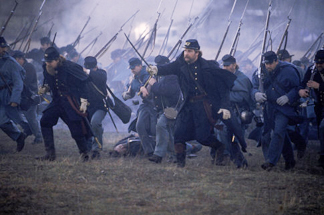Gods and Generals
Ten Years Later, Turner Fires Again
By Patrick Reed

Never bring a sword to a gunfight.
Rarely, if ever, has a film's title been more indicative of its content than with Gods and Generals, and this prequel to 1993's Gettysburg could be just the right tonic for that large chunk of Americana that, according to the "polls," supports pre-emptive military action in Iraq. The pre-release build-up tells the tale: a TV trailer sword-into-stone logo that strongly resembles the U.S. Marines' recruitment commercials, a two talons-up recommendation from Robert Novak on CNN's Capital Gang, and a glittering herald from American Enterprise Magazine as "the best historical film. Period." God only knows what "Rush-bo" Limbaugh, or better yet, the Fox News Cartel, er, Channel has to say about it, although upon second thought there might be a Rupert Murdoch-ordered blackout going on at the moment. See, Gods and Generals is quite obviously a labor of love for one Theodore Turner, cable-TV revolutionary, Atlanta Brave kingpin, and philanthropist for many a good cause. According to the Atlanta Journal-Constitution, Turner personally footed the entire $90 million-plus budget for Gods and Generals, which is damn amazing considering the man's plummeting net worth in these days of AOL-Time Warner stock erosion.
Turner's gamble appears even braver (or more foolhardy) when considering that Gettysburg performed dismally at the box office in autumn 1993, nearly 10 long years ago. Then again, the four-and-a-half-hour epic didn't really find an audience until it was split up into a two-night event on TNT in '94; since then, a fan base of Civil War re-enactors and other history buffs has adopted Gettysburg as a paragon of historical accuracy. Furthermore, the current state of the nation is, despite the "polls," more than a little tense over the prospect of war, so maybe, just maybe, Turner, the maverick graybeard will be able to strike a chord with American filmgoers who need some sort of emotional uplift in these uncertain times. After all, Mel Gibson has done quite well by clumsily pushing the patriotic buttons of the populace in recent years, hasn't he?
Still, it's hard to recoup $90 million from a three-and-a-half hour movie-especially an agonizingly dull one, which Gods and Generals most certainly is. It's initially hard to fathom: Gettysburg, although chock full of melodramatic music, countless character soliloquies, and repetitive combat footage, managed to somehow maintain a grip on its narrative. Gods and Generals, which documents the early stages of the Civil War (primarily the Virginia theater from Bull Run to Chancellorsville), is roughly forty-five minutes shorter than Gettysburg, but feels almost twice as long; and keep in mind that basically the same creative team is on hand for this picture-writer/director Ronald Maxwell, the cinematographer, the editor, and several cast members.
The reasons for Gods and Generals' relative lethargy are soon easy to spot, however; for one thing, this story's much-longer time-span (almost two years, vs. Gettysburg's three days) leaves plenty of space between battles for Maxwell to insert drawn-out speechifying, contemplation, and prayer. Also, Gettysburg gained much dramatic force from the interplay between Confederate Generals Robert E. Lee (Martin Sheen) and James Longstreet (Tom Berenger), who disagreed on strategy before and during Gettysburg's fateful final day. Gods and Generals, on the other hand, has no compelling personal conflict at its core; the film follows several different groups of people, but focuses mainly on Confederate Gen. Thomas "Stonewall" Jackson (Stephen Lang). Compared to Sheen's self-doubting Lee in Gettysburg, Robert Duvall's portrayal in Gods and Generals amounts to little more than a mythic cameo. And as "Stonewall," Lang (who played Confederate Gen. Pickett in Gettysburg) exudes a strain of quivering-lipped piety that, as the film plods on, regrettably becomes contagious to combatants both blue and gray. Even Jeff Daniels' Union Col. Joshua Chamberlain, quietly moving in Gettysburg's closing moments, falls victim to the pervasive grandstanding in Gods and Generals-he actually comes across as more war-weary this time 'round, even though he is ostensibly younger.
Gods and Generals has two positive qualities: its historical reverence is immaculate, right down to the last uniform button and military maneuver, and the location shooting (Virginia, Maryland) provides plenty of stunning landscapes for all of the riding around, marching, shooting, and dying. Conversely, the injustices of slavery are mildly handled by Maxwell; from time to time, the peculiar institution is decried by characters white (Chamberlain/Daniels) and black (Frankie Faison as "Stonewall" Jackson's free horse-handler, Donzaleigh Abernathy as a Fredricksburg matron) but overall the politics of this movie are, like the rest of it, far too cushy. Instead of incisive historical analysis and a compelling dramatic arc, Gods and Generals serves up, over 215 looooong minutes, tedious battles, maudlin death scenes, wooden romance, and so much invoking of God Almighty that one begins to wonder when Robert Duvall will shed his Confederate regalia, grab a King James, and morph into his Pentecostal revival-preacher from (the admittedly great) The Apostle. Hey – at least Ted Turner gets to play another bit part as a devoted son of Dixie. Not bad for $90 million, if you can spare it.
HOME | THIS ISSUE | ACE ARCHIVES